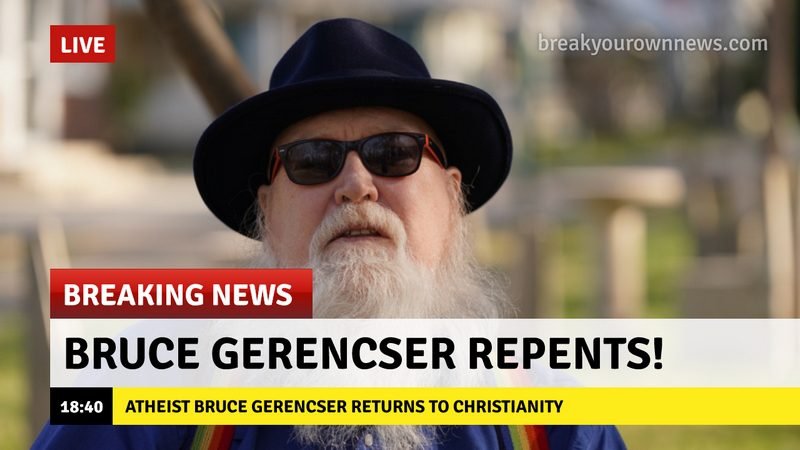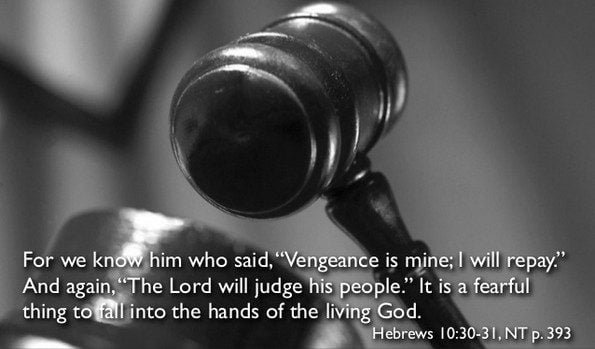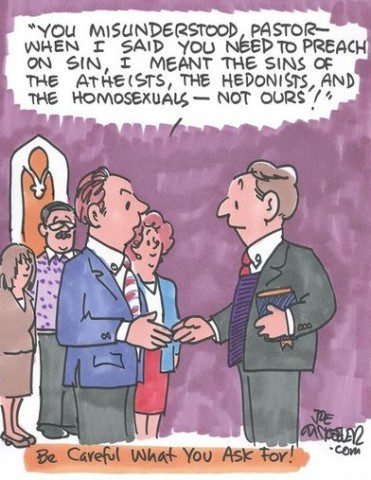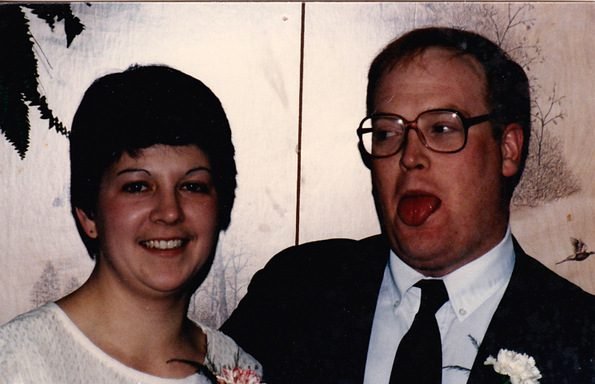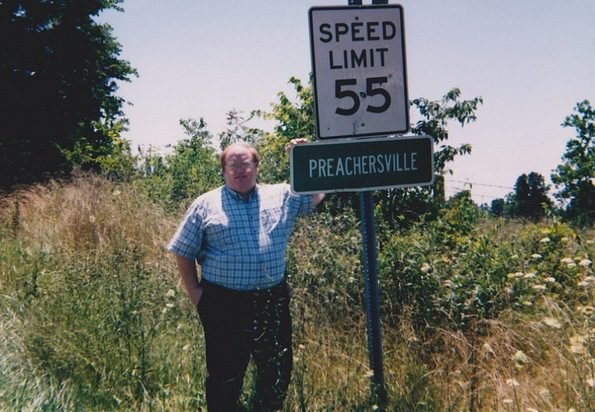
Part One of a Two-Part Series (part two)
For many Evangelical church attendees, the manner in which the pastor gets his sermons has an aura of wonder about it. How does he, week after week, come up with sermons that speak directly to them? Where do these sermons come from? How are they prepared? In this two-part series, I will focus on pastors and their preaching.
I have little respect for lazy-ass preachers who rarely, if ever, spend any time crafting their own sermons. Week after week they rip off the work of others and pass it off as their own. They scour the Internet looking for sermons to preach. They subscribe to sermon clubs that provide them with new sermon material. They buy sermon outline books or lectionaries and use them to prepare sermons that they then pass off as their own; anything that allows them more time for schmoozing with their fellow clergymen at the local golf course or diner. In any other profession, they would be considered thieves.
Let me give a few examples of what I’m talking about.
In 2005, my family and I visited for a number of weeks at a local nondenominational church. On our second visit, I began to sense something wasn’t right about the pastor’s sermons. He quoted a lot of Scripture, but his quotations were from various Bible translations. Lots of them. I thought “hmm . . . there’s something about this that seems familiar.” I went home and consulted the mind of God (aka the Google) and my suspicions were quickly confirmed. The pastor was ripping off the sermons of Rick Warren and preaching them as his own, word for word. We visited this church half a dozen times and the pastor never preached an original sermon of his own. Ironically, one Sunday the pastor asked for testimonies from congregants and several people stood up and praised Jesus for how wonderful the pastor’s sermons were. I thought “If they only knew.”
For several years, on an off-and-on basis, we visited the local Episcopal church. When the parish priest was there the sermons, as a rule, were excellent. However, there were many Sundays when the priest was absent, and at those times the sermons ranged from mediocre to absolutely dreadful. The worst ones were the sermons that were taken from books, magazines, or lectionaries and read to the congregation (These sermons reminded me of some of the worthless college classes I took where the professor read the textbook to us). The justification for reading the sermon was “Hey, it is better than nothing.” No, it wasn’t.
In 1984 I invited a pastor I knew come to the church I was pastoring to hold a week of special meetings. He asked me what I wanted him to preach. He then proceeded to list off numerous sermons of other preachers which he had memorized — famous sermons by noted preachers. I was shocked by his willingness to rip off the sermons of others and pass them off as his own. I told him I would rather he preach his own material. Little did I know, at the time, that using sermons preached by others was a common practice.
Many pastors recycle their sermons. The average Baptist pastor changes churches every 2-3 years. No need to craft new sermons, just reuse the sermons you preached before. If they worked well in Ohio, surely they will work well in Texas, right? I remember one well-known evangelist named Phil Shuler who kept long silver cases filled with recordings of his previous sermons. After collecting his sermons for many years, he would just pick a recording to re-familiarize himself with the sermon and then preach it that night. Rarely did he preach new material.
One more example: in the mid-1980s, I managed a Christian bookstore in Newark, Ohio for Bill and Peggie Beard. Over the course of my employment, I came into contact with dozens of pastors from a variety of denominations. I was astounded by how many pastors bought sermon outline books or lectionaries. I was beginning to wonder if any preacher crafted his own sermons!
Now, I don’t necessarily blame a pastor for using bought sermon outlines or reading verbatim from a lectionary. Truth is, there are a lot of pastors who lack good communication skills and, in many cases, they received little training in proper sermon construction and delivery. I think some pastors know they suck at preaching, so they do what they can to limit their suckiness.
From 1976-1979, I attended Midwestern Baptist College in Pontiac, Michigan, an Independent Fundamentalist Baptist (IFB) institution started by Tom Malone in 1954. Every preacher-in-training was required to take speech and homiletics. The speech class was pretty much a waste of time, and very little of the instruction transferred over to the art of preaching a sermon. In fact, my homiletics teacher, Levi Corey — a world-class preacher — told the class on day one that we needed to forget everything we were taught in speech class. According to him, preaching a sermon was all about the text and the pastor’s ability to deliver it passionately. Outlines and illustrations were essential to successfully delivering a sermon.
Years ago, I was acquainted with a pastor who had horrible preaching skills. He was a Bible college graduate, yet he didn’t even know how to make a sermon outline. I tried to show him how to make a basic outline, but he had a hard time understanding the process. His approach was quite simple: read the text, chase rabbits, bring it back to Jesus, pray, and give an altar call. I never heard this man preach a coherent sermon. While he had great people skills, his preaching, at every point, was lacking.
There are a lot of preachers like the man mentioned above. Poorly trained or lacking the requisite skills necessary to effectively communicate with others through a well-preached sermon, they go from church to church killing everything they touch. They may have great people skills, but if they can’t preach passionately and effectively, they often do more harm than good.
Far too many men become preachers because someone told them that their gift of gab made them great candidates for the ministry. The truth is, running on at the mouth is not a gift at all, especially in the pastorate. All of us have heard those sermons that drone on and on and on. Don’t blame the preacher. Blame the person who told him he would make a great pulpiteer.
By the way, what I have said here also applies to other teaching-related jobs in the church such as Sunday school teacher, youth leader, or bible-study leader. I’ve had to sit through more aimless, heresy-ridden, ill-prepared Sunday School lessons than I care to remember. One man, my high school Sunday school teacher, told me that he studied his lesson on Saturday night while he was sitting in the bathtub. As this man’s class on Sundays proved, a lack of preparation yields a barren crop.
Here’s my point: the ability to preach and teach is a gift (not in a supernatural sense) just like the ability to do virtually anything else people do. Each of us has things we do that come easily to us. We enjoy it. And if we are smart, we will further develop the things we enjoy. Far too many people spend their lifetime trying to become things they will never be good at. It’s less than honest to tell everyone they can be anything they want to be. The sky is not the limit, and, no, not everyone can become President. A lot of men enter the ministry lacking the requisite skills necessary to be a good preacher. They simply are in the wrong profession, but since they believe GOD called them to the ministry, they refuse to admit that maybe they might be better off doing something else.
Many pastors would have you believe that their sermons come directly from God. I know I believed this for many years. I was certain that God was leading and directing me to preach on a particular Biblical text. I believed that God was guiding me through the delivery of the sermon all the way to the altar call. I was simply God’s mouthpiece.
As I look back over the thousands of God-inspired sermons I preached, I can now see who it was that was guiding me. It wasn’t God. It wasn’t the Holy Spirit. It was me. Through my own thought processes, I decided what the church needed to hear. Sometimes I had an agenda that I wanted to advance and what better way to do so than to couch my agenda in “Thus saith the Lord” terms.
Preaching came easy for me. I loved the intellectual aspect of preparing the sermon. I loved to read and study, preparing my mind for delivering the sermon. I devoted hours of study to virtually every sermon I preached (though I also was quite comfortable preaching extemporaneously). While most preachers won’t admit it, lest they give the impression that they are taking praise and glory away from God, they love the attention that preaching brings their way. As a person who has struggled with self-esteem issues his entire life, I found the love, respect, and adoration showered on me by parishioners quite affirming.
Remembering my preaching is one of the things that makes my defection from the Christian faith so troubling for many former parishioners. As Baptists, we believed once saved, always saved (eternal security, perseverance of the saints). This means that once people put their faith and trust in Jesus they can never, ever lose their salvation. People are left, then, with either believing I am still a Christian or that I never was. Neither choice sits well with them, especially for those who heard me preach and viewed me as someone who played an important part in their spiritual formation.
I’ve been criticized for a lot of things I did as a pastor, and rightly so. I was arrogant, narrow-minded, and rarely put up with dissent. I ran off a lot of good people. That said, few people have ever criticized my preaching. For the most part, the people I pastored found my sermons well crafted, worth listening to, and, at times, quite humorous and entertaining.
Hundreds and hundreds of people made public professions of faith as a result of my sermons. Lives were changed and people were delivered from sins. If I was never saved, what does that say about all the fruit I gathered over the course of 25 years in the ministry? If by their fruits ye shall know them, surely I proved that I was a great fruit grower?
I have no doubt that I could, even as an atheist, go to a church and preach a sermon that everyone would find inspirational and entertaining. I’m sure those listening to me would think God was speaking through me or using me to touch their hearts. What if I then told them I was an atheist? How would they explain their response to my oratorical gem?
Effective preaching requires passion and charisma. Two of our recent presidents are good examples of what I mean here. Forget the party affiliation or platform for a moment. Who would you rather listen to giving a stump speech? Barack Obama or George W Bush?
Good preaching moves people to go beyond themselves. Good preaching inspires and motivates. A good example of this is Martin Luther King, Jr’s I Have a Dream speech. And this is why preachers who excel at their craft are so dangerous. The potential for abuse and manipulation is great. Far too often, parishioners check their minds at the church door. When the winsome, charismatic pastor preaches they soak up his words like a sponge. If they are not careful and cognizant of the potential for manipulation they can easily be led astray. (Please see Should a Christian Preacher Turned Atheist Stop Using His Public Speaking Skills?)
I still like hearing a well-crafted sermon. I respect people who attempt to excel at what they do. Sadly, I have heard more sorry, pathetic, poorly-crafted, rabbit-trail sermons than any one person should ever have to listen to. I feel sad for church members who have to sit under this kind of preaching week after week. In fact, they sit under it long enough that they begin to think that their preacher’s pathetic sermons are the norm.
Why I am being so hard of preachers? Why should I, a card-carrying atheist, give a rat’s ass over the quality of sermons in the Christian church?
First, preaching is what I did for many years and I still like to talk about it.
Second, I think people should do what they do well. I hate half-assed wherever I find it, whether it be in the pulpit or the local fast-food restaurant.
Third, I realize that the world is always going to be predominantly religious. If that is so, I think people of faith should have leaders that thoughtfully and honestly teach them the beliefs of their particular religions. They deserve to have leaders who are passionate about what they do. Sadly, in many denominations, the higher a man rises in the denominational hierarchy the more worthless he becomes. Does anyone consider any of the popes a great orator?
I know this post is pretty pointed. I am of the general opinion that the United States is awash in mediocrity. It seems everything has been turned into an audition for American Idol or America’s Got Talent. People are told that they can be whatever they want to be, so they become what they want to be and not what they ought to be. Result? School teachers who can’t teach. Retail workers without basic people skills. And yes, preachers who can’t preach.
Bruce Gerencser, 68, lives in rural Northwest Ohio with his wife of 47 years. He and his wife have six grown children and sixteen grandchildren. Bruce pastored Evangelical churches for twenty-five years in Ohio, Texas, and Michigan. Bruce left the ministry in 2005, and in 2008 he left Christianity. Bruce is now a humanist and an atheist.
Your comments are welcome and appreciated. All first-time comments are moderated. Please read the commenting rules before commenting.
You can email Bruce via the Contact Form.


